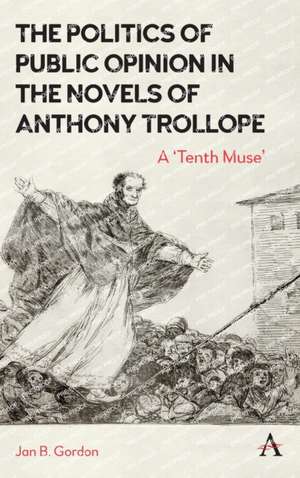The Politics of Public Opinion in the Novels of Anthony Trollope
Autor Jan Gordonen Limba Engleză Hardback – 17 ian 2023
Preț: 647.80 lei
Preț vechi: 799.75 lei
-19% Nou
123.97€ • 134.61$ • 104.14£
Carte tipărită la comandă
Livrare economică 22 aprilie-06 mai
Specificații
ISBN-10: 183998693X
Pagini: 244
Dimensiuni: 157 x 235 x 19 mm
Greutate: 0.55 kg
Editura: Anthem Press
Descriere
The figurative “body” of public opinion presents challenges to readers of the nineteenth-century British fiction insofar as it lacks the markers of an autonomous subject. It replaces direct address with intimations of surveillance and interpellation, reading characters and their actions as we read it for our situationally within it. In the novels of Anthony Trollope who continually refers to a vox populi, public opinion has an economy, as a kind of “currency” in which reputation is priced and marketed while itself seeming inconclusive and undeveloped, even among its self-appointed spokesmen.
It takes its place among a number of institutions that knit the country together as a network of conveyances with different points of entry: roads, railroads, ports and canals and the post office in which Trollope served as a civil servant for over 30 years. One such institution is the expanding bureaucracy which mediates between the people and those who regulate human activity and its exposure to government regulation. The ex-posure (literally to be placed outside oneself) is one of the ways in which public opinion, lacking a responsible subjectivity that can be held to account, removes individual subjectivity, threatening (or enabling) a rebirth in accountability. Yet, for all of its potentially subversive qualities, public opinion is a collective narrative—disguising itself as a unitary voice—that often misreads character and, in the Parliamentary Novels, ideology. As it is vulnerable to being misread by politicians, public opinion also misreads, especially the arrivistes attempting to enter the social and economic life of the country. Because of its resistance to inscriptive genres, the vox populi may well represent the lost orality of the epic to which critics like Georg Lukaks have called our attention.
Although “public opinion” has always existed, it becomes an acknowledged political subject in both the Oxford English Dictionary (1864) and the Barsetshire Chronicle and Parliamentary Novels of Anthony Trollope contemporaneously with 1) the penetration of the press into local issues and 2) the entire question of which “publics” were to be represented. Public opinion hence is a composite of parliamentary law-making as well as a kind of appellate division for society’s social (and judicial judgments), providing an alternative narrative. It differs from gossip in the nineteenth-century novel insofar as it contains no instruction manual (“don’t tell anyone, who told you but...”), but can be manipulated by a variety of new informational platforms to not merely impact, but constitute decision-making. Detached from any unitary authority and often anonymously narrated, public opinion, like the orphan-figure of nineteenth-century literature, is a discourse discontinuous from history, tradition, class alignments, and foundational origins to become a “law unto itself.”
